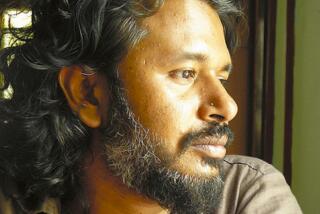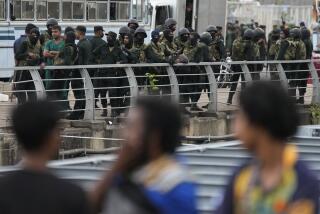Leader’s Killing Darkens Shadow Over Sri Lanka
- Share via
NEW DELHI — The suicide bomber who killed one of Sri Lanka’s most respected leaders seemed intent on cutting away the last bits of middle ground left on the shattered island.
Neelan Tiruchelvam, a prominent member of Sri Lanka’s Tamil minority, died Thursday when a man laden with explosives dashed into the street and threw himself on Tiruchelvam’s idling car in Colombo, the Sri Lankan capital. Tiruchelvam and the attacker died instantly, and five others were injured. In a macabre scene typical of such assaults, the intact head of the bomber came to rest in a nearby gutter.
The bombing appeared to be the work of the Liberation Tigers of Tamil Eelam, or LTTE, a fierce band of guerrillas who have been fighting for a separate Tamil homeland since 1983. The war, which pits the mostly Hindu minority Tamils against the mostly Buddhist majority Sinhalese, is one of the world’s bloodiest and longest-running conflicts. The fighting has claimed more than 55,000 lives in a nation of 18 million.
Tiruchelvam, 55, was one of Sri Lanka’s most influential figures, a Tamil who defied the guerrillas and worked for reconciliation of the country’s two main ethnic groups. A soft-spoken Harvard-trained lawyer, Tiruchelvam helped draft changes to the constitution that would grant greater autonomy to the Tamil-dominated areas in Sri Lanka’s north. The measure is considered by many on the island--formerly known as Ceylon--to be the best hope to end the war. President Chandrika Kumaratunga is expected to ask the Sri Lankan Parliament to approve the measure in September.
Tiruchelvam became the latest in a long line of moderate Tamil politicians thought to have been killed by the guerrillas, who are commonly known as the Tigers. To many in Sri Lanka, Tiruchelvam’s death signals that the Tigers will support nothing less than full independence and will even kill members of their own ethnic group who stand in their way.
“The LTTE has taken out a key figure among moderate Tamils because moderate opinion is threatening to them,” said Paikiasothy Saravanamuttu, a Tamil writer and activist. “They brook no dissent.”
Tiruchelvam was a member of the Tamil United Liberation Front, one of the handful of Tamil-dominated political parties that have joined the Sri Lankan electoral process. Over the years, several of the front’s leaders have been killed by the Tigers, who condemn any compromise with the government.
The Sinhalese-dominated Sri Lankan Cabinet observed two minutes of silence to honor Tiruchelvam. The U.S. government condemned the attack. In Colombo, friends and admirers recalled a man who, despite the bitterness caused by years of civil war, refused to give up hope that the Tamils and Sinhalese could live together in peace.
Without him, they said, the cause seems bleaker than ever.
“He was bringing people together,” said Sherine Xavier, a lawyer in Colombo. “Now, there is no voice for a pluralistic society.”
Tiruchelvam, a husband and father of two, was scheduled to spend the next several months lecturing at Harvard.
“He said he was getting out of politics,” Xavier said.
The Tigers launched their war for a separate homeland in 1983 after years of official discrimination against Tamils by the Sinhalese majority. Since then, the Tigers have proved to be one of the world’s most dedicated and ruthless armed groups.
Guerrilla cadres often carry cyanide pills into battle and swallow them just before being captured. A female suicide bomber blew up former Indian Prime Minister Rajiv Gandhi in 1991, and another bomber killed 100 people in 1996 when he drove a truck bomb into the Sri Lankan Central Bank. The U.S. government has declared the Tamil Tigers a terrorist organization.
The fighting between the guerrillas and government forces has been so bloody that few people in the country have been untouched by the violence. Hidden bombs and police checkpoints are a fixture in the capital. Hundreds of Sri Lankans have disappeared in presumed extrajudicial killings, tens of thousands have fled their homes, and half a million have left the country.
Saravanamuttu, the Tamil writer and analyst, said he has lost many friends to the conflict. Even so, he said Tiruchelvam’s slaying left him numb because it left hopes for peace as dim as ever.
“You get one tragedy after another here--they always keep coming back to you,” Saravanamuttu said. “How many more people have to die before this will end?”
More to Read
Sign up for Essential California
The most important California stories and recommendations in your inbox every morning.
You may occasionally receive promotional content from the Los Angeles Times.










